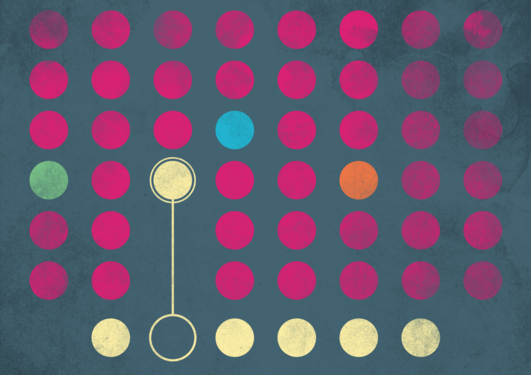Responsible Disagreement
The workshop aims to explore the nature of political disagreement and the epistemic, moral, and political norms that govern such disagreement.

Main content
Disagreement among citizens in the political sphere is a persistent feature of democratic societies. The relevance and implications of this disagreement for theories of justice, political legitimacy, and democracy is a central occupation of contemporary political philosophers. However, disagreement is also an important topic in contemporary epistemology, with a focus on how it is rational to revise one’s beliefs in response to disagreement. The workshop will bring together these different perspectives in order to provide a more comprehensive picture of the norms that govern political disagreement.
Program with Titles and Abstracts
Thursday the 22nd of August
09:15-09:30 Coffee
09:30-10:45 Jesse Tomalty (University of Bergen) and Torfinn Huvenes (University of Bergen): From Reasonable Disagreement to Responsible Disagreement
10:45-11:00 Break
11:00-12:15 Jesse Tomalty (University of Bergen) and Torfinn Huvenes (University of Bergen): Varieties of Political Disagreement
12:15-13:15 Lunch
13:15-14:30 Paul Billingham (Oxford University): The Place of Epistemology in Public Reason
14:30-14:45 Break
14:45-16:00 Hugo Ribeiro Mota (University of Oslo): Deep Disagreements and Power: Communication Under Oppression
Workshop Dinner: Time and Place TBD
Friday the 23rd of August
09:15-09:30 Coffee
09:30-10:45 Jaakko Hirvelä (University of Helsinki): Disagreement and Inquiry
10:45-11:00 Break
11:00-12:15 Han van Wietmarschen (University College London): On Deference
12:15-13:15 Lunch
13:15-14:30 Alex Worsnip (University of North Carolina, Chapel Hill): In Defense of Psychologizing
Titles and Abstracts:
Jesse Tomalty (University of Bergen) and Torfinn Huvenes (University of Bergen):
From Reasonable Disagreement to Responsible Disagreement
Disagreement among citizens in the political sphere is a persistent feature of democratic societies. How should we respond to this disagreement? This is the central question of our project, in which we aim to develop an account of what we call responsible disagreement. The purpose of this talk is to introduce the project and situate it in relation to existing scholarship related to disagreement in both political philosophy and epistemology.
Jesse Tomalty (University of Bergen) and Torfinn Huvenes (University of Bergen):
Varieties of Political Disagreement
The purpose of this talk is to develop a taxonomy of political disagreement. To that end, we distinguish between cognitive and non-cognitive disagreement, normative and non-normative disagreement, and practical and non-practical disagreement. We go on to argue that these distinctions are normatively significant. What kind of disagreement it is makes a difference to how we should respond to it, both epistemically and practically.
Paul Billingham (Oxford University):
The Place of Epistemology in Public Reason
What role does epistemology play within public reason views? Rawls’s explanation for the reasonableness of disagreement—the burdens of judgment—and of the characteristics of reasonable comprehensive doctrines both involve epistemological claims, which thus play a role in justifying his account of public justification and public reason. Nonetheless, this role is a limited one; moral ideals also characterise reasonable disagreement and do the main justificatory work. Some theorists have gone further and argued that epistemological claims play the central role in justifying public reason. Others have taken the opposite route, and argued that epistemological claims should play a much more limited, or even no, role within public reason views. This paper will argue that both of these approaches are mistaken, and will defend something like the original Rawlsian position. Epistemological claims play an important role in explaining reasonable disagreement and justifying public reason, and thus cannot be removed from the view, but that those claims nonetheless play a limited role, with moral claims doing the primary justificatory work. Further, the paper will defend the relevant epistemological claims from critics who argue that the epistemology required by public reason views cannot be both plausible and not itself subject to reasonable disagreement.
Hugo Ribeiro Mota (University of Oslo):
Deep Disagreements and Power: Communication Under Oppression
Power is relevant to most communicative interactions, especially so when oppression is involved. Accounts of 'deep disagreement' should not overlook how power inequality and structural oppression affect the phenomenon. This is particularly important when considering political deep disagreements, which may lead to oppression or be a consequence of it. In my assessment, a reconceptualization of 'deep disagreement' is necessary in order to understand its complexity. Therefore, I propose an ameliorative analysis of 'deep disagreement' which allows for moving beyond epistemic attitudes and argumentative approaches mainly oriented towards rational resolution. This new model of deep disagreement recognizes the role of perspectives, structuring commitments, attention, salience, and forms of communicative exchange oriented to other outcomes. One of the main benefits of this revision is the ability to use the concept of deep disagreement more effectively to account for actual social and political conflicts, which in turn contributes to the extremely challenging task of understanding them without resorting to problematic oversimplifications.
Jaakko Hirvelä (University of Helsinki):
Disagreement and Inquiry
Recent literature on the normativity of inquiry agrees that inquiry is a goal-directed activity with a constitutive standard of success. Many hold that knowledge is that standard. If one is required to find out whether Q one will have met one’s obligation by coming to know that Q. Elsewhere, I have argued that disagreement is unable to defeat knowledge. The fact that you disagree with someone you take to be your epistemic peer does not undermine your knowledge. But it is often reasonable to double-check our contested beliefs. Can the idea that knowledge is the constitutive standard of success for inquiry, and that apparent peer disagreement calls for further inquiry even though it doesn’t undermine knowledge, be held consistently? In this talk I develop a theory of zetetic supererogation to navigate a course between these ideas. According to this theory one’s further inquiry is In this talk I develop a theory of zetetic supererogation to navigate a course between these ideas.supererogatory if one satisfies one’s zetetic requirements in a way that permissibly exceeds the standards of successful inquiry. Utilizing this concept, I argue that it can make perfect sense to exceed the standards of success for inquiry in cases of apparent peer disagreement.
Han van Wietmarschen (University College London):
On Deference
Deference tends to have a bad name in ethics. With the deferential housewife as a central figure in the literature, deference is seen as a threat to autonomy or self-governance. By comparison, deference is much more favorably regarded in epistemology, seen as expressing an appropriate kind of intellectual humility in light of the limitations of our individual intellectual capacities and evidence. Political deference sits somewhere in the middle, sometimes taking the form of adjusting our beliefs to expert opinion, sometimes of changing our votes or other political actions in response to others' say so. The evaluation of political deference is correspondingly ambiguous. I propose that we can clarify some of the issues in this area by thinking about deference as a general concept, and especially about the relationship between deference and social hierarchy.
Alex Worsnip (University of North Carolina, Chapel Hill):
In Defense of Psychologizing
Following Amy Flowerree (2023), let's say that we "psychologize" when engaged in a disagreement with another person when we claim that the reasons they sincerely offer in favor of their beliefs do not really explain why they believe as they do, and instead offer an alternative (causal and/or genealogical, often subpersonal) explanation—perhaps appealing to their upbringing, interests, or desires—that is intended to debunk or otherwise cast doubt on their belief. There's a large literature on whether, epistemically speaking, such causal explanations do debunk or cast doubt on the beliefs in question. But in recent, separate papers, both Flowerree and Nick Smyth argue that regardless of how that epistemological debate is resolved, there are deep ethical problems with psychologizing. In doing so, they tap into broader societal ideas about norms of public discourse that claim that we should always engage with others' stated reasons for their claims and beliefs rather than trying to cast doubt on their motivations. My aim in this paper is to defend the ethical credentials of psychologizing. First, I build up a positive case for psychologizing by suggesting that it is often our only practical recourse for critique under conditions of ideological distortion, and by highlighting the inherent limits involved in the project of rebutting others' stated reasons. Second, I rebut the claim that there's something necessarily uncivil or disrespectful about psychologizing. While psychologizing undeniably carries the pragmatic risk of causing a defensive, counterproductive reaction in its target, I argue that we should work toward norms of public discourse under which we are more open to psychologizing critiques of our own beliefs, and under which being the apt target of such critiques is significantly destigmatized.



